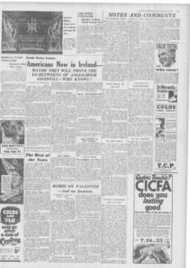Page 2, 6th February 1942
Page 2

Report an error
Noticed an error on this page?If you've noticed an error in this article please click here to report it.
Tags
Share
Related articles
Recognised Schools
Juvenile Crime
Problems In Education
Control Of Bar Convent School
Teachers: Religious And Lay
TEACHERS
Religious or Lay
Si,—As a fully qualified lay teacher in a fully recognised Convent School, and one educated in Convent Schools, may I reply to what I consider an unwarranted and dangerous attack on our I caching Orders by E. J. K. in the ar ticle entitled " I was Hungry "? In UOIng so, 1 should like to name some of the " counterbalancing " factors mentioned oy me Lintor.
Before a school is recognised fully as grant-aided by the Government, the qualitications of the staff, religious and lay (no distinction between these with the "Board"), must satisfy H.M. Inspectors and the Board of Education. Hence no unqualified person could be appointed.
I challenge the statement that the qualification of religious compare unfavourably either with those of Jay teachers on tesantemstatl y h or with those in Grammar Schools " twopenny halfpenny " 'Se Is the writer in Ignorance, confusing Recognised Secondary Schools with " Convent Private Sesendary Schools," which have no Government aid and so arc not bound by the same rules as Grammar Schools? Even so, by my own personal experience, I happen to know that in the Private Schools it is much More often the religious who are qualified more than the lay teachers. In one such school I was the only lay teacher out of several to have a degree and be fully qualified—the rest were either " failed degree " or no teaching certificutes. Every nun held a degree and was qualified to teitekt.
Elementary school teachers, religious or lay, arc appointed by .Managers subject to the approval of the Local Education Authority (again I speak from knowledge and personal experience). All roust satisfy the Inspectors and the Board of their capability during a probationary year and in subsequent inspections. No unqualified persons here! In some cases the school buildings are supplied and kept in repair by a Convent or Monastery. The religious then, having the same qualifications as the lay, are entitled liced to positions on the staffs, and to s The raison d'Otre of a Catholic School is to teach the children to live our Religion. The best place for this is obviously a convent or monastery under the same roof as the Blessed Sacrament, in an atmosphere conducive to appealing to the religious instincts of children. The best people to spread the knowledge of the "Kingdom of God " are those who are dedicated to vow to the Service of God. Hence (as the Editor remarks) the preference of most Catholic parents (and many non-Catholic') for
schools run by religious, As to convent schools (presumably the writer means private ones) claiming recognition—this would he impossible for all. The Government is hardly likely to recognise school after school. Many other considerations count apart from qualitications--e.g. numbers.
With regard to " worldly knowledge "— the majority of Convent and Monastery schools have the most up-to-date equipment and methods, and the religious are able to impart to their pupils a practical and topical knowledge of worldly affairs and problems. Again, that is my personal knowledge.
" First rate " persons are not necessarily " lay," nor " second-rate " necessmily religious as assumed by U.K. I, a lay teacher, hereby acknowledge my debt to those who educated me and from whom, since teaching—in which I have had nearly 14 years' experience—I have invariably had more help in practical teaching problems than from any lay teacher—Head or Assistant (again, personal experience). I think it more than probable that E.J.K. (unless a convert) also must owe a similar debt of gratitude to many " first-rate " religious. Incidentally, a University Course for a teacher need not cost £500.
Finally, a comment on what seems to be a most un-Catholic criticism. Since all teachers tend to " shepherd " pupils into the profession, trade, or type of life they think most suitable—into what higher type of life could they be " shepherded " than that of the community of those who obey the highest call of Our Lord? It used to be the prayer of all true Catholic parents (and surely still is) to " have a priest and/or a nun in the family." LAY TEACHER IN CONVENT &Hoot (Fully recognised).
blog comments powered by Disqus









